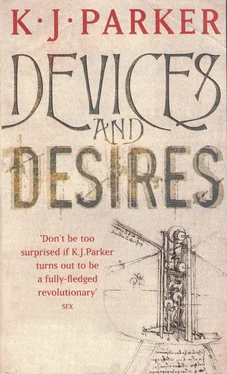K Parker - Devices and Desires
Здесь есть возможность читать онлайн «K Parker - Devices and Desires» весь текст электронной книги совершенно бесплатно (целиком полную версию без сокращений). В некоторых случаях можно слушать аудио, скачать через торрент в формате fb2 и присутствует краткое содержание. Жанр: Фэнтези, на английском языке. Описание произведения, (предисловие) а так же отзывы посетителей доступны на портале библиотеки ЛибКат.
- Название:Devices and Desires
- Автор:
- Жанр:
- Год:неизвестен
- ISBN:нет данных
- Рейтинг книги:3 / 5. Голосов: 1
-
Избранное:Добавить в избранное
- Отзывы:
-
Ваша оценка:
- 60
- 1
- 2
- 3
- 4
- 5
Devices and Desires: краткое содержание, описание и аннотация
Предлагаем к чтению аннотацию, описание, краткое содержание или предисловие (зависит от того, что написал сам автор книги «Devices and Desires»). Если вы не нашли необходимую информацию о книге — напишите в комментариях, мы постараемся отыскать её.
Devices and Desires — читать онлайн бесплатно полную книгу (весь текст) целиком
Ниже представлен текст книги, разбитый по страницам. Система сохранения места последней прочитанной страницы, позволяет с удобством читать онлайн бесплатно книгу «Devices and Desires», без необходимости каждый раз заново искать на чём Вы остановились. Поставьте закладку, и сможете в любой момент перейти на страницу, на которой закончили чтение.
Интервал:
Закладка:
It was Miel's turn to shake his head. 'I wasn't talking about that,' he said. 'I ought to kill you for what you did to her. And to Orsea, my best friend.'
Vaatzes considered that. 'You'd have a stronger case on those grounds, certainly,' he said. 'But that wouldn't be the real reason, just an excuse. No,' he went on, getting painfully to his feet, 'you won't do anything to me. For all sorts of reasons. Saving my life, for instance. That took some arranging, by the way.'
Miel had thought he was beyond surprise by now. 'Arranging?'
Vaatzes smiled and nodded. 'On reflection,' he said, 'it was worth the effort. It got me into your house for an extended stay, which meant I was able to make contact with your housekeeper and various other members of the household. It was hard work, though; hours and hours reading those ridiculous books-King Fashion and the Mirror; and teaching myself to shoot a bow and arrow. All that, just so I could talk to a few domestic servants without making them suspicious.'
'I don't understand,' Miel said weakly.
'What? Oh, right.' Vaatzes leaned against the doorframe. 'I read in one of the books, King Fashion, I think, about the dangers of boar-hunting. It said that a boar who's been shot in the back leg with an arrow is particularly dangerous; it can't run away, which is what its instincts tell it to, but it can still use its front legs to drag itself along and get at you, so you can pretty well guarantee it'll attack. So I made myself a bow and I practised until I could hit a target the size of a boar's back leg every time. I knew there'd be no guarantee that the perfect opportunity would arise, but it was worth going along just in case it did. And I got lucky; and it all worked out perfectly after all. That benign providence again, I suppose. On balance, I'd have preferred it if you'd shown up about five seconds earlier; I'd have got away with some nasty cuts and bruises, and I could've faked broken bones and internal injuries instead of having to put up with the real things. But, like I said, it all came out just right. I got into your house like I wanted; also, because of your personal code of chivalry, it turned me into one of your responsibilities, someone you had to help and look out for thereafter. Naturally, that made my life much easier, by putting me above suspicion.' He smiled slowly. 'I won't deny I've had one or two really big slices of luck, but at least I've made the most out of them. A bit like a man killing a pig; nothing goes to waste, it all turns out to be useful.'
Miel looked at him. 'Get out,' he said. 'And if I ever set eyes on you again, I will kill you. For the reasons stated.'
Vaatzes nodded, thanked him for the wine and left. He'd have liked to stay longer and explain further, but as always he was racing a deadline. Soon-he wasn't sure when, of course, he was basing all his timings on estimates, little more than guesses-soon the Mezentines would be creeping up through the maintenance tunnels, heading for the gate. That would be a problem, of course; when he'd sent his letters to Falier, the first of them months ago, with the instructions enclosed, he hadn't foreseen the destruction and walling up of the gateway. It remained to be seen what effect it would have on the overall working out of the design; from here on, for a while, it was all out of his hands. He felt a degree of apprehension about that, quite naturally, and also a certain relief. He was far more tired than he'd anticipated he would be at this point, and that in itself was a reason to feel apprehensive.
Now, at least, he didn't have anything in particular to do. He daren't go back to his room at the factory and fall asleep; the factory was too near the gate, for one thing, and he would need to be fairly close to the palace. He didn't relish the prospect of wandering aimlessly about for an hour, or three hours, however long it was going to be. The sensible thing to do would be to find somewhere light and sheltered, and read the book he'd brought with him.
(Ludicrous, he thought; who else but me would remember to bring a book to read while waiting for a massacre to start? But, he reflected, all his life he'd had a peculiar horror of being bored, and he'd been saving this particular book for when he needed to take his mind off something. So; it was just a perfectly reasonable act of preparation.)
He wandered out into the courtyard, just below the tower. Since he was already inside the restricted area, and the guards knew who he was and why he was here, nobody was likely to bother him. They kept torches burning all night here-visibility was important, prisoners can escape better in the dark-and there was a bench he could sit on. Light to read by, and it wasn't uncomfortably cold, just fresh enough to help him stay awake. He sat down, curled his coat tails round his knees, and opened his book. The candidate [he read] is not expected to understand the theoretical basis of perfection; nor is he encouraged to consider such matters in any further detail than that included in the syllabus. It is sufficient for him to be aware that, in a necessarily imperfect world, perfection is most immediately and tangibly represented in the various established specifications ordained by each Guild for its members.
However, some observations on the basic principles of this subject will prove useful to the candidate, and should be committed to memory. First, perfection can be expressed as the smallest degree of tolerance of error or divergence from Specification that can be obtained in the circumstances prevailing in each instance. Thus, a standard tolerance of one thousandth of an inch is allowed for in specifications of lathe work and most milling operations. In casting, a tolerance of ten thousandths is permitted; in general carpentry, twenty thousandths, although in fine joinery and cabinet-making this is reduced to ten thousandths.
None of these divergences can be taken to express perfection; a perfect artefact must conform to Specification exactly. Given the inevitability of error, however, the Guild recognises the need for strictly regulated tolerance, and such tolerance is therefore included in the specification. The question arises, therefore, whether an artefact that is perfect, i.e. one that contains no error whatsoever, can be in accordance with Specification; since it differs from the prescribed form by omitting the permissible degree of error, is it not therefore out of Specification, and therefore an abomination?
This issue was addressed by the seventh extraordinary assembly of the united Guilds, who declared that a perfect artefact is permitted provided that in its creation there was no inherent intent to improve upon Specification by reducing error beyond permitted tolerance. Evidence of such intent would be, among other things, modification of other components to allow for or take advantage of perfection in any one component. Thus, if a mechanism is found to have only one perfect component, intent is not found; whereas if more than one component is perfect, and if the perfection of one component is ancillary to or dependent upon the perfection of another (for example, where two parts fit together), there is a rebuttable presumption of such intent, and the accused must prove beyond reasonable doubt that no such intent was in his mind when he produced the components.
He rested the book on his knees for a moment, then turned the page. Perfection is most often attained, or, more usually, aspired to, through the destruction or removal of material. Such destroyed or discarded material is referred to as waste. Waste can he created by separation (for instance, by sawing off surplus material) or by attrition (e.g. filing, turning). The creation of waste can therefore be partly or wholly destructive. It is policy that wherever possible, partial destruction is preferred to total destruction, since surplus material that is only partially destroyed-off cuts, for example-can often be put to good use. However, this preference should not be allowed to interfere with the imperatives of precision. Thus, where a more exact result can be obtained by a wholly destructive process, e.g. filing or milling, than by a partially destructive one such as sawing or chain-drilling, total destruction is preferred. Acceptable levels of waste are, of course, allowed for in all Specifications, and any attempt to reduce waste beyond the specified levels is prohibited. As the report of the ninth general review committee puts it, waste is part and parcel of any properly conducted procedure; material is there to be cut and destroyed in the furtherance of the design.
Читать дальшеИнтервал:
Закладка:
Похожие книги на «Devices and Desires»
Представляем Вашему вниманию похожие книги на «Devices and Desires» списком для выбора. Мы отобрали схожую по названию и смыслу литературу в надежде предоставить читателям больше вариантов отыскать новые, интересные, ещё непрочитанные произведения.
Обсуждение, отзывы о книге «Devices and Desires» и просто собственные мнения читателей. Оставьте ваши комментарии, напишите, что Вы думаете о произведении, его смысле или главных героях. Укажите что конкретно понравилось, а что нет, и почему Вы так считаете.












